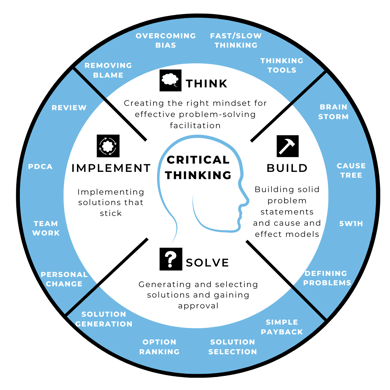
Cert IV Leadership and Management (RTO 40575)
Training Provider: Efficiency Works
Delivery Method: Public, In-House & Virtual
Critical Thinking for Problem Solving
Training Provider: Industry Partners Australia
Delivery Method: Public, On-site

What Will I learn:
We have created an interactive and enjoyable format that allows participants to learn in an open and engaging environment. We will guide participants in developing their skills because we passionately believe that problem solving is an opportunity, not an imposition.
Our educators have practical problem-solving experiences to draw upon. In addition, we have seen first-hand how vital correct problem-solving facilitation is to creating success.
What Outcomes will the training provide?
- Understand the elements of thinking critically.

- Be able to identify and act on common cognitive biases that exist in problem-solving teams.
- Lead teams towards clarity and alignment on problem understanding.
- Learn the secrets to leading effective brainstorming.
- Effectively educate others on developing correct cause and effect chains.
- Think like a business owner when selecting potential solutions.
Who will benefit from attending this training?
What is the duration of this training?
This program is delivered over one full day.
Training Overview
The course comprises 12 units of competency, workshops, and interactions with the client through course content to meet the specific needs of the clients and students.
What will I learn?
The program comprises a combination of elements aimed at facilitating behavioural change through the application of specific concepts and techniques tailored to suit your organisation's needs. The direct and immediate application into more effective teams and workplace projects converts into improved decisions, improved team engagement and lower levels of resistance and conflict.
What outcomes will the training provide?
This training program delivers the following outcomes for participants and the organisation:
- Plan and prioritise own work tasks, including monitoring and obtaining feedback on personal work performance.
- Lead teams and individuals by modelling high standards of conduct to reflect the organisation’s standards and values.
- Facilitate and apply communication strategies in the workplace.
- Determine individual and team development needs and facilitate the development of the workgroup.
- Effectively lead and facilitate a team in a workplace.
- Use leadership to promote team cohesion including motivating, mentoring, coaching, and developing the team and forming the bridge between the management of the organisation and team members.
- Implement operational plans by planning and acquiring resources, monitoring, and adjusting operational performance and providing reports on performance, as required.
- Lead and manage continuous improvement systems and processes with a particular emphasis on the development of systems and the analysis of information to monitor and adjust performance strategies, and to manage opportunities for further improvements.
- Establish and develop a professional mentoring relationship with an individual in a workplace.
- Identify and implement ways of promoting innovation within team environments in the workplace.
- Implement and monitor an organisation’s work health and safety (WHS) policies, procedures and programs in the relevant work area in order to meet legislative requirements.
- Identify business risks and to apply established risk management processes to a defined area of operations that are within the responsibilities and obligations of the role.



